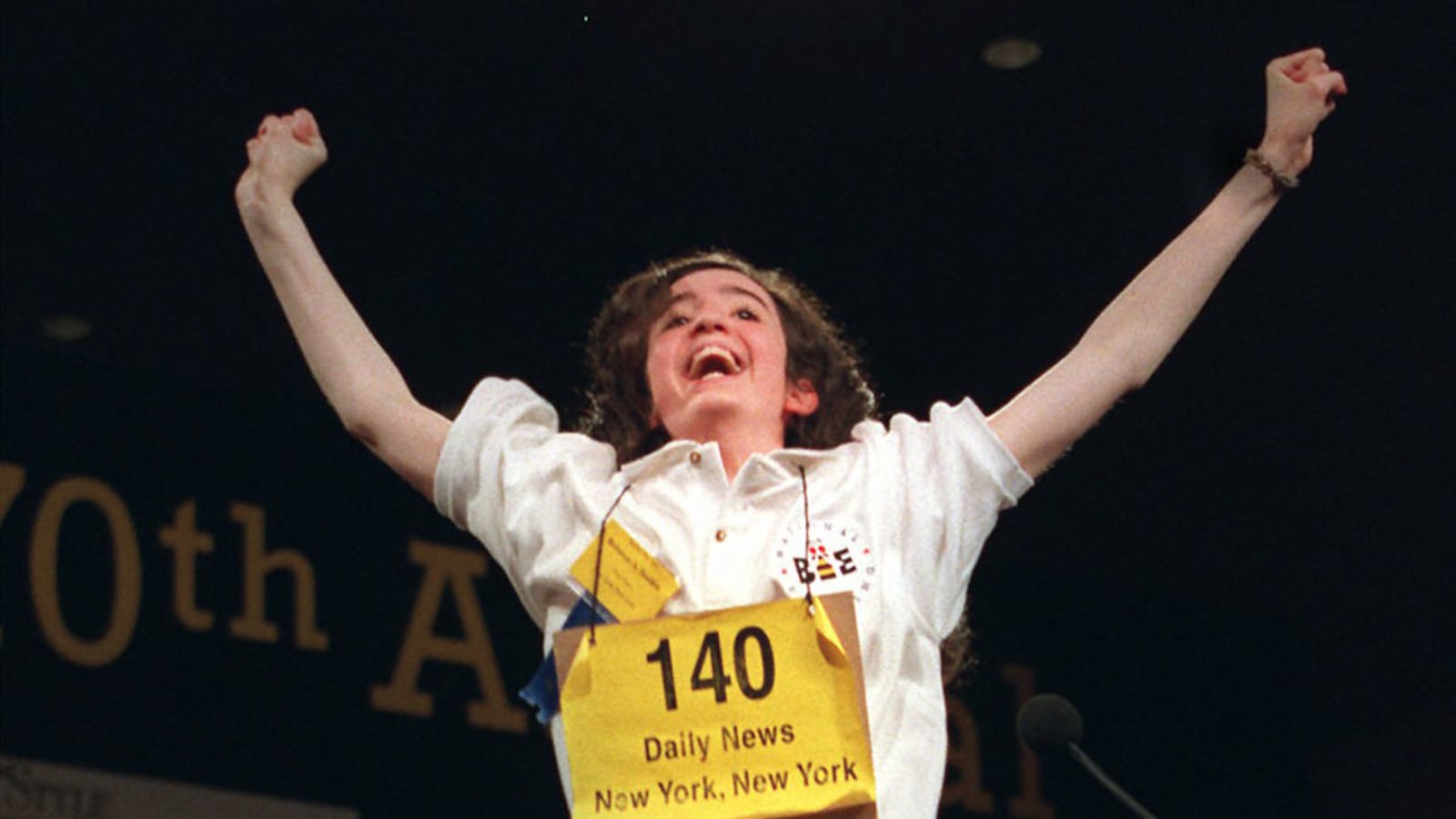“She started screaming like she was on fire.” That’s how one news outlet remembers the grand finale of the 1997 Scripps Howard National Spelling Bee.
I remember that hour vividly. It felt unreal to be sitting in front of the bright lights, the stage empty except for the video cameras and my last remaining opponent. He spelled first, and I followed. Phylactery. Nomothetic. Analemma. He seemed well prepared. But so was I. We were able to sustain our battle for many rounds—I was grateful after each round that the word I received would not be my last. I lost count of how many. I had studied the history of previous spelling bees; rarely had two contestants lasted so long without slipping.
Going into the contest, I’d eagerly anticipated the rest of the week—everything except the bee itself. For one week a year, the spellers—pianists, chess players, writers, among others—are plucked from every corner of the country to compete in Washington D.C. I remember trying to meet as many people as I could: in the grand atrium of the hotel, at the gala events, during tours of our nation’s capital. I’d written to some of my friends whom I’d met during the spelling bee the year prior. One friend and I had talked about what would happen if we both made it to the end; how if we were the last two spellers, we’d tell the contest’s word pronouncer that we wanted to be co-champions (three previous spelling bees had allowed multiple winners).

This was no longer possible; my friend had misspelled the word mitomycin many rounds earlier. It had been a long day of waiting and painfully considering each word, and I was tired. No matter what happened, I knew this spelling bee was my last. After the eighth grade, I would be too old to compete. I remember being excited and scared at the same time. I’d never made it so far before. I didn’t want to let myself down, not after all the times I’d awoken before six or seven in the morning, memorizing word lists. Ever since I was a fifth grade city champion, I’d dreamt of winning this competition, of being the best speller in America. I was ready to seize that dream.
Suddenly my opponent slipped, and I saw opportunity. The judges challenged me with another word—which I knew. Coterie. “Does this word mean a clique?” I’d prepared for something much more difficult. I spelled it quickly—but carefully. “Correct,” the judges said. Then they gave me the second word. Time passed slowly. But I knew the answer. I looked out into the audience and screamed the letters into the microphone: “E! U! O! N! Y! M!” This was the real thing. The trophy was mine.
Some 15 years have passed since then. Earlier this month, around the time that a new crop of students once again entered the spelling bee, I finished graduate school at Columbia University. On one of my last days as a student, I remember taking a break to peruse the university bookstore. One title stood out—The Hunger Games—which tells the story of teenagers who are placed in an arena and forced to kill each other until only one survives. And I thought: the spelling bee was sort of like that.
Competitive spelling is a very American contest; Americans particularly enjoy watching winners win and losers lose. As a winner, I had a greater hand in creating my own story. I could say what I wanted. Once I asked the contest's word pronouncers: “How come you’re asking such ridiculous words?” Another time I said that the bee shouldn’t exist, that there’s no reason to pit such talented people against one another and that the event would be just as entertaining if we celebrated all of our talents.
I still believe the words I spoke (and not just the ones I spelled correctly). During graduate school, I conceived of a website called ResearchMatch, and now I’m steering it on its maiden voyage. The idea is for professors to post their projects in one central place, and to encourage undergraduates to join research labs and advance science and engineering. My website is about how many students can win, and hopefully not just the select few.
As I continued to walk around the store, I noticed someone browsing the racks beside to me.
“Are you the spelling bee champion?” he asked.
Hundreds of thousands of people have watched videos of me on YouTube. Many years ago, people used to stop me on the street. Now it’s a question I rarely get asked.
The other day, a friend called me to tell me that Daniel Radcliffe—the star of the Harry Potter movies—was on campus. A mob of people were waiting around and my friend wanted to know if I wanted to join. I didn’t. I wanted to let the actor be free to enjoy the fragrance of spring.
“Yes,” I told the man at the bookstore, “I am the spelling bee champion.” Then I turned away and returned to my reading.





